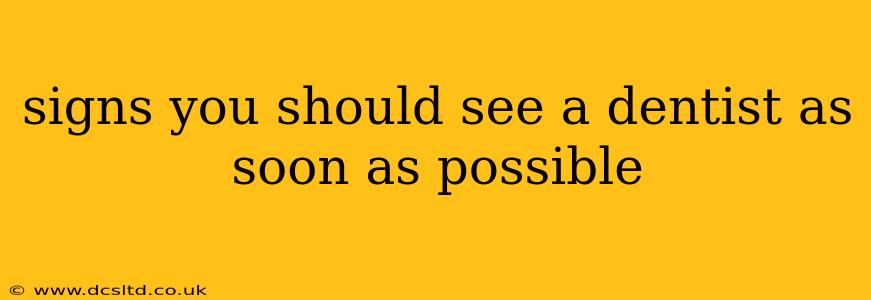Maintaining optimal oral health is crucial for your overall well-being. Ignoring dental problems can lead to serious complications, impacting not only your teeth and gums but also your overall health. This article outlines key signs indicating you should schedule an urgent appointment with your dentist. We'll cover common concerns and answer frequently asked questions to help you understand when immediate dental attention is necessary.
Severe Toothache
A persistent, throbbing toothache is a major red flag. This isn't just about sensitivity to hot or cold; we're talking about intense pain that disrupts your daily life. The pain could stem from a cavity, an abscess (a pus-filled infection), or a cracked tooth. Delaying treatment can lead to the spread of infection, potentially requiring more extensive and costly procedures. Don't endure the pain – contact your dentist immediately.
Swollen Gums or Bleeding Gums
Noticeably swollen gums are often a sign of gum disease (gingivitis or periodontitis). Inflammation can cause discomfort, redness, and bleeding, especially when brushing or flossing. Advanced gum disease can lead to tooth loss. Bleeding gums, even without swelling, could indicate a problem that needs attention.
What causes swollen and bleeding gums?
Poor oral hygiene is the most common culprit. Food particles and plaque build up along the gum line, irritating the gums and creating an environment for bacteria to thrive. However, other factors like hormonal changes, certain medications, and underlying health conditions can also contribute. Your dentist can accurately diagnose the cause and recommend appropriate treatment.
Loose Teeth
If you notice that one or more of your teeth are becoming loose, seek immediate dental care. This could signal advanced gum disease, an infection, or trauma to the tooth or supporting structures. Early intervention can often save the tooth; delaying treatment dramatically reduces the chances of successfully preserving it.
Abscess
A dental abscess is a serious infection at the root of a tooth or within the gums. Symptoms include intense pain, swelling, fever, and possibly even difficulty opening your mouth. An abscess requires immediate treatment with antibiotics and possibly drainage to prevent the infection from spreading to other areas of your body. This is a true dental emergency.
Facial Swelling
Swelling in your face, particularly around your jaw or cheeks, is a serious sign requiring immediate attention. It could indicate an infection (like a severe abscess) or an impacted tooth. The swelling might be accompanied by pain, but not always. This is a situation where quick action is paramount.
Broken or Chipped Tooth
A broken or chipped tooth, even if it doesn't cause immediate pain, requires professional attention. Ignoring the damage can lead to infection, further chipping, or increased sensitivity. Your dentist can assess the extent of the damage and determine the best course of action, which may involve a filling, crown, or other restorative treatment.
Persistent Bad Breath (Halitosis)
While bad breath can sometimes be addressed with better oral hygiene, persistent bad breath that doesn't improve despite diligent brushing and flossing warrants a visit to the dentist. It could be a sign of an underlying infection, gum disease, or even a more systemic health issue.
How can I improve my breath?
Beyond seeing your dentist, maintaining excellent oral hygiene is critical. Brush and floss thoroughly at least twice a day, and consider using a tongue scraper to remove bacteria from your tongue. Regular dental checkups also play a critical role in preventing bad breath and identifying potential oral health issues early on.
Jaw Pain or Clicking
Experiencing pain or clicking in your jaw joint (temporomandibular joint or TMJ) could indicate temporomandibular joint disorder (TMD). This condition can cause headaches, earaches, and difficulty opening and closing your mouth. Your dentist can diagnose and provide appropriate treatment options.
Remember, it's always better to err on the side of caution when it comes to your oral health. If you have any concerns, don't hesitate to contact your dentist for an evaluation. Early intervention can save you time, money, and significant discomfort in the long run.
